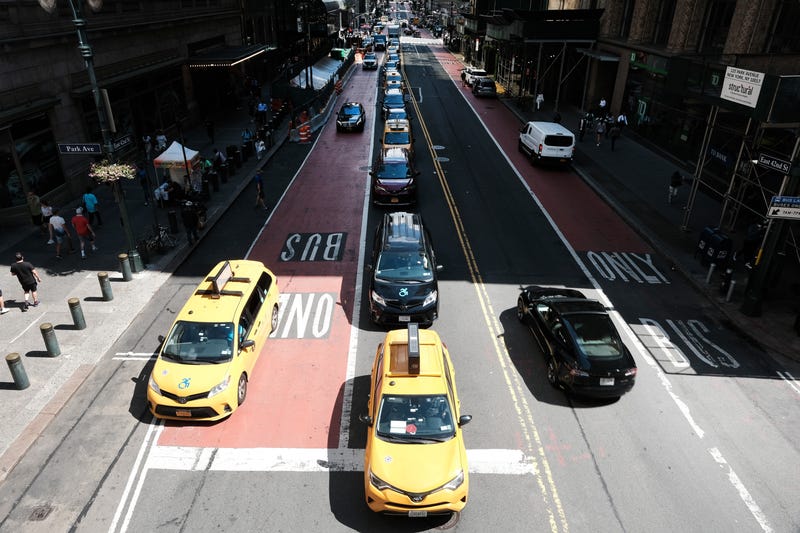
NEW YORK (1010 WINS/ WCBS 880 NEWS) – The United Federation of Teachers and the Staten Island Borough President's Office announced their filing of a federal lawsuit on Thursday seeking to stop the implementation of congestion pricing set to start in the spring in Manhattan, citing concerns over its rushed and hurried approval process.
“We know that our traffic will get worse, our air quality will get worse, and residents who must commute by car will pay an added tax to travel within their own city,” Staten Island Borough President Vito Fossella said in a statement. “We are suing because at some point, we have to say ‘enough is enough.'”
The lawsuit, filed in Brooklyn federal court by the United Federation of Teachers, blames transportation authorities for rushing the process for approval and claims its sole focus on “raising revenue,” challenging the review for taking place before the actual tolling plan is determined.
The plan aims to raise about $1 billion annually for the MTA to support its subway, bus, and rail systems.
“It was what we would say in my world is 'the kid only read the cliff notes,'” United Federation of Teachers President Michael Mulgrew said. “They cut corners constantly and everywhere. It was just an assessment.”
Under the proposed plan, vehicles entering Manhattan, from 60th Street through Midtown to the Battery will be subject to tolls. Passenger cars will be charged a base toll of $15, while trucks and buses will incur higher rates, potentially reaching up to $23 during rush hour. The plan aims to reduce traffic congestion by as much as 20%.
The lawsuit argues that this plan prioritizes the MTA's revenue needs over the requirements of New York and New Jersey commuters and demands exemptions for public service workers, many of which are living in areas with limited transit options, and rely on driving to work.
Although toll gantries have been installed south of 60th Street in Manhattan, the MTA acknowledged last month that ongoing lawsuits might delay the implementation of the program, initially targeted for this spring.
The lawsuit called out the program as "regressive and discriminatory." It argued that the program should not be implemented until a comprehensive environmental impact study, including potential effects on air quality in Staten Island and the Bronx, is completed.
In response, MTA Chief of Policy and External Relations, John J. McCarthy explained that there was a four-year environmental review process for congestion pricing. The process involved consultations with government agencies, public outreach, and analysis of thousands of public comments.
McCarthy emphasized the program's consideration of traffic, air quality, and environmental justice impacts.
"And if we really want to combat ever-worsening clogged streets we must adequately fund a public transit system that will bring safer and less congested streets, cleaner air, and better transit for the vast majority of students and teachers who take mass transit to school,” McCarthy said.
The plaintiffs argued that the plan would “not eliminate air and noise pollution and traffic, but would simply shift pollution and traffic to Staten Island, the Bronx, Upper Manhattan, and Northern New Jersey."
The lawsuit requests the court to direct the Federal Highway Administration to conduct a comprehensive Environmental Impact Statement for the congestion pricing plan. It also seeks to pause the program until this detailed assessment is completed.
"Teachers, firefighters, police officers, EMS workers, sanitation workers and other public sector workers who are essential to the fabric of New York City would be forced to shoulder the burden of the MTA’s latest fundraising gambit," the lawsuit read.
The next step after the public review process is that the MTA will review the public comments. They will then consider adopting a rate-making regulation that includes any updates resulting from the public review.
To provide feedback, an online form is accessible at https://contact.mta.info/s/forms/CBDTP, and comments can also be sent via email to cbdtp.feedback@mtabt.org.
Four public hearings are scheduled for Feb. 29, March 1, and twice on March 4, with online livestreaming available on the MTA's YouTube channel.
